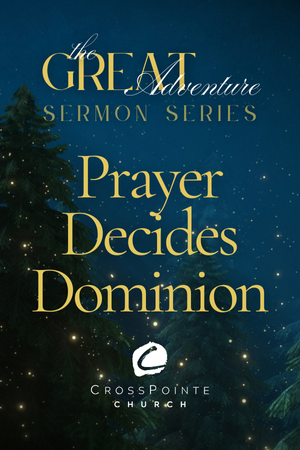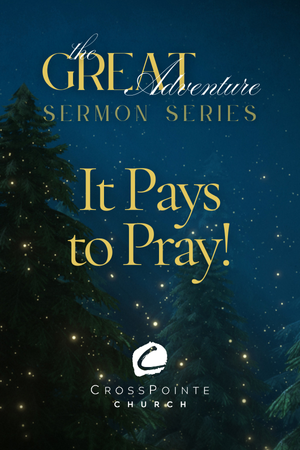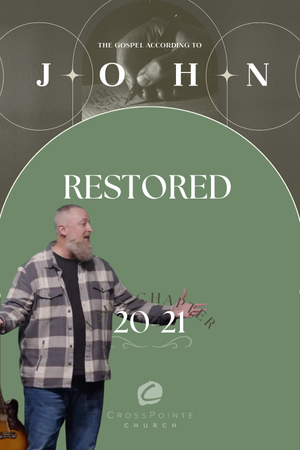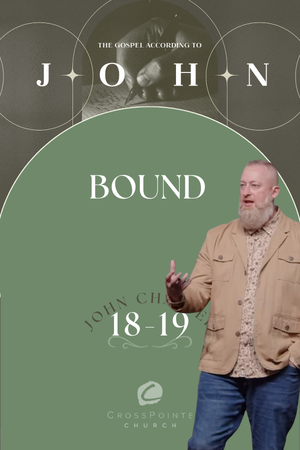Hungry for More: How Fasting Shifts Desire and Prayer Releases Authority
Pastor Tim Johnson delivers a powerful message on fasting and prayer as we enter a new season. He explains that fasting shifts our hunger from earthly satisfaction to a deeper desire for God's presence and Word. Mentioned over 70 times in Scripture, fasting was a common practice in the early church, and Jesus expects us to fast, saying "when you fast" in Matthew 6. Pastor Tim emphasizes that fasting isn't just about food - it's about removing distractions to make room for God to speak and transform us.
The second focus is on prayer, which Pastor Tim describes as deciding dominion. Drawing from Luke 10:19, he reminds us that Jesus has given believers authority to trample on snakes and scorpions - the principalities and powers of the enemy. When we pray, we activate this delegated authority and surrender our own dominion to God's. Pastor Tim outlines five types of prayer: simple prayer (starting where you are), prayer of the desert (when God seems silent), prayer of examination (inviting God to search our hearts), prayer of tears (honest emotional expression), and prayer of relinquishment (surrendering our will to God's). He challenges listeners to consider what dominates their thinking, because whatever dominates has dominion over us.
The Great Adventure: It Pays to Pray
In his sermon "The Great Adventure," Pastor Johnathan presents prayer as the cornerstone of Christian living, especially during the Christmas season which celebrates the ultimate answered prayer—Jesus coming to Earth. Drawing from Colossians 1:9-14, he warns against making prayer our last resort when we become too busy or independent, pointing to Jesus who, despite His packed ministry, always made time to pray before daybreak (Mark 1:35).
Pastor Johnathan outlines the benefits of relational prayer: letting God be God, deepening our relationship with Him, releasing pressure, and transferring burdens. He emphasizes that Christians are born into a battleground, not a playground, and prayer is how we enforce Christ's victory in our lives. The sermon concludes with a practical exercise where congregants write down prayer requests—whether strongholds needing to be broken or promises to hold onto—and bring them to the altar, encouraging everyone to "keep on asking, seeking, and knocking" as Matthew 7 instructs.
The Gospel of John: When Jesus Restores What Shame Destroyed
In the conclusion of his series on the Gospel of John, Pastor Johnathan focuses on how Jesus's resurrection distinguishes Christianity from all other religions. As he notes, "Confucius died 479 BC, Buddha died 483 BC... Muhammad died 632 AD... and the common factor with all of them is that they are still in their tombs." Jesus's resurrection becomes our restoration, freeing us from the bondage of sin and the lies of the enemy who, according to John 8:44, "is a liar and the father of lies."
The sermon examines how Jesus restored His disciples with peace (John 20:19), appearing to them behind locked doors saying "Peace be with you." Pastor Johnathan emphasizes that peace is "not the absence of something, but the presence of someone" - Jesus Himself. The sermon culminates with Jesus's restoration of Peter in John 21, where Jesus asks Peter three times if he loves Him, corresponding to Peter's three denials. With each affirmation, Jesus commissions Peter to "Feed my lambs... Take care of my sheep... Feed my sheep," reminding us all that we are the disciples Jesus loves, called to declare in every circumstance, "It's the Lord."
The Gospel of John: Pilate, Peter & Judas: Three Men Bound by Different Chains—Which One Are You?
Pastor Johnathan examines John chapters 18-19, focusing on Jesus' arrest, trial, and crucifixion. The pastor identifies how different characters in the narrative were spiritually bound—Judas was enslaved by greed, Peter was chained by denial, Pilate was trapped by people-pleasing, and the religious leaders were constrained by empty religion. These same bondages continue to afflict believers today, causing us to compromise our faith and live in fear rather than freedom.
The pastor emphasizes that true liberation comes through Jesus' declaration on the cross: "It is finished" (John 19:30). This powerful statement breaks every chain—whether it's depression, anxiety, addiction, or generational curses. The sermon also highlights "the fear of the Lord" as today's "lost treasure," explaining that holy fear isn't being afraid of God but being afraid of being away from Him. When we fear God properly, we're freed from fearing anything else, including the opinions of others.
The Gospel of John: The Enemy Fears THIS: Unlocking the Power of Bold Prayer
In this sermon on John 17, the pastor explores what many theologians consider "the Lord's Prayer"—Jesus's longest recorded prayer in Scripture. This prayer, which Scottish evangelist John Knox requested to hear on his deathbed, is divided into three sections: Jesus praying for himself, for his disciples, and for all future believers (including us today).
The sermon's title "Back to You" emphasizes how Jesus consistently pointed everything back to glorifying the Father. The pastor explains that if Jesus thought it important to stay in contact with His Father through prayer, we should certainly do the same. He challenges the congregation to pray boldly and audibly like Jesus did, rather than always whispering, and to ensure our prayers aim to glorify God rather than merely seeking personal benefit. The message concludes with an emphasis on unity among believers, which the pastor describes as "the Church's perfume" and "an incense to heaven."
The Gospel of John: Remain In Me
This sermon delves into Jesus's teaching from John 15-16, particularly His command to "remain in Him." The pastor vulnerably shares personal struggles with betrayal and the recent death of a beloved mentor, using these experiences to illustrate the difficulty and necessity of remaining in Christ during painful seasons. Drawing from John 15:5, "I am the vine, you are the branches... apart from me you can do nothing," the message emphasizes our complete dependence on Christ for spiritual life and fruitfulness.
The pastor explains that God's pruning process isn't meant to hurt us but to make us more fruitful, cutting away things that hinder our growth. The sermon also outlines five essential roles of the Holy Spirit: saving, teaching, testifying, convicting, and guiding. Through remaining connected to Christ and empowered by the Spirit, believers can overcome persecution, produce lasting fruit, and experience the peace Jesus promised in John 16:33: "In this world you will have trouble. But take heart! I have overcome the world."
The Gospel of John: The Power Behind the Plot
In this sermon, Pastor Johnathan explores the contrast between Satan's plots and God's plan through the Holy Spirit. Using John 14:15-31 as his foundation, he explains that while Satan constantly schemes to lead us away from Jesus, the Holy Spirit is the "power behind the plan" working for our good. Pastor Johnathan emphasizes that the Holy Spirit is not a force or feeling, but the third person of the Trinity who has been present since creation (Genesis 1:2).
The pastor clarifies common misconceptions about the Holy Spirit, categorizing people as uninformed, misinformed, or well-informed about the Spirit's role. He reminds us that obedience to Christ opens the door to intimacy with Him and true satisfaction, and that the Holy Spirit enables us to hold onto God's promises despite opposition. As Pastor Johnathan concludes, "Being filled with the Spirit is not how much of the Holy Spirit you have. It's how much of the Holy Spirit has you."
The Controversial Claim
Pastor Johnathan continues his series through the Gospel of John, entering chapter 14 where Jesus is now focusing His ministry on His disciples in the final hours before the cross. The sermon centers on Jesus' controversial yet truthful declaration in John 14:6: "I am the way, the truth, and the life. No one can come to the Father except through me." Pastor Johnathan emphasizes that Jesus only speaks truth because He is truth, which is why His words often offend the world and demonic forces.
The pastor boldly calls out examples where churches and religious leaders have compromised Biblical truth, including a Lutheran minister who denounced the Great Commission, a Catholic priest living as a drag queen, and churches hosting drag performances. He quotes Chip Ingram saying, "Truth without love cuts people down. Love without truth leaves them lost. Jesus never chose between the two. Neither should we." Pastor Johnathan stresses that Christians must speak truth in love, quoting Melissa Cedra: "I would rather offend you into heaven than affirm you into hell."
Moving into John 14:1, Pastor Johnathan explores Jesus' command to "not let your hearts be troubled," explaining that we must control our emotions rather than letting them control us. He states, "Trouble doesn't build character, it reveals it," and "Don't let your circumstances speak louder than God's word." The key to trusting God during difficult times is knowing Him through His names—Yahweh, Jehovah Rapha, El Shaddai, Adonai, and others—which reveal His character and nature.
The sermon then addresses Jesus' teaching about preparing a place in heaven (John 14:2-3). Pastor Johnathan notes that Jesus spoke about hell 33 times during His ministry (more than He spoke about heaven), not because He wants people to go there, but because He desperately wants them to avoid it. He contrasts the horrors of hell with the glories of heaven, quoting Revelation 21:4: "God will wipe away every tear from their eyes. There shall be no more death, no sorrow, nor crying. There shall be no more pain, for the former things have passed away."
Pastor Johnathan concludes by unpacking Jesus' promise of "greater works" for believers, explaining that this refers not just to miracles but to the global spread of the gospel and the transformation of lives. He emphasizes that Christianity isn't about religious ritual but about surrender to Jesus that leads to transformation, quoting Romans 10:13: "For everyone who calls on the name of the Lord will be saved." The sermon ends with an invitation for listeners to surrender their lives to Jesus and experience His transformative power.
The Gospel of John: The REAL Threat to Christianity (It's NOT What You Think)
Beginning with a humorous personal story about a difficult morning, the pastor transitions to the sermon's core message about following Jesus' example. Drawing from Matthew 4:19 and Mark 8:34, he emphasizes that following Christ requires giving up our own way and embracing Jesus' way, even when it's difficult.
The sermon centers on John 13, where Jesus washes His disciples' feet during the Last Supper. This act demonstrates that serving others is never beneath us—even Jesus, with all authority, stooped to wash feet. The pastor highlights three key examples to follow: we are called to be servants, we need to remain clean by continuing to let Jesus in, and we must love one another sacrificially. He concludes that love isn't a "goosebump reaction" but "an act of the will," reminding the congregation that through the Holy Spirit, we have an infinite capacity to love as Romans 5:5 teaches.
The Gospel of John: Light in a Dark World: Why the Church Must Stop Adjusting to the Darkness
Pastor Johnathan examines John 12, where Jesus enters Jerusalem during His final week before crucifixion, coming as light into a morally dark world. The pastor emphasizes that today's church faces similar darkness, with pressure to accept sin in the name of inclusion. However, true Christian love means guiding people away from sin through Jesus's redemptive power. Using the image of fish jumping from dark waters, Pastor Johnathan explains that even in our darkest times, there are still souls needing salvation, and believers must choose to stand at the cross rather than follow the crowd. The church's calling isn't to "wake up" but to "stay awake," remaining alert to spiritual warfare while glorifying God even in suffering.
The Gospel of John: Stop Waisting…
In this sermon, Pastor Johnathan returns from a difficult period to emphasize that God is opening doors of opportunity for believers who stay spiritually awake. He shares a personal story of witnessing at a bar, where he seized an opportunity to explain 1 Corinthians 13:8 and 1 John 4:8 to strangers engaged in a heated discussion about faith.
Examining John 12:1-11, Pastor Johnathan highlights how Martha, Lazarus, and Mary each refused to waste their opportunity with Jesus. Martha served without complaining, Lazarus sat in Jesus' presence after being raised from the dead, and Mary sacrificed a year's wages worth of perfume to anoint Jesus' feet. Pastor challenges the congregation to consider their own stewardship of opportunities, including financial giving, emphasizing that obedience in tithing isn't about prosperity but about worship that fills the room with a spiritual fragrance, just as Mary's perfume filled the house.
The Gospel of John: Jesus Brings Dead Things to Life
In this sermon on John 11, Pastor Steve Smith examines the story of Lazarus's resurrection, revealing how Jesus brings life to dead situations. Pastor Steve reminds us that we were all once "dead in our trespasses and sins" (Ephesians 2:1) until Jesus gave us new life. However, even as believers, we often bury our hopes in certain areas—whether in struggling marriages, chronic illness, unfulfilled dreams, or wayward children.
Pastor Steve highlights the profound truth that "Jesus wept" (John 11:35), showing that our Savior understands grief and has compassion for our pain. He identifies four key principles about resurrection: God resurrects for His glory, not our convenience; it may take longer than we expect; people may mock our faith; and the process might be messy. The sermon concludes with a powerful call to believe God can resurrect what seems dead, to do what He asks even when it doesn't make sense, to listen to His voice, and to allow the community of believers to help "unwrap" us from our grave clothes.
The Gospel of John: Come Alive!
In "Come Alive," Pastor Daniel Courade delivers a powerful message centered on John 11:8-16, where Jesus decides to return to Judea despite the danger, and Thomas declares, "Let's go to and die with Jesus." Pastor Daniel frames this passage in light of the recent death of Charlie Kirk, whom he describes as a Christian martyr who died for boldly proclaiming his faith.
The sermon emphasizes three key principles: God's delays are not denials but setups for His glory; following Jesus means being willing to sacrifice everything for Him; and Jesus shines brightest in our darkest moments. Pastor Daniel challenges the congregation to move beyond "lukewarm Christianity" and embrace a bold, fearless faith that's willing to stand for truth even when it costs everything. He concludes that when we understand Jesus is the resurrection and the life, we can face any opposition with courage, knowing that "death doesn't get the last word. Jesus does."
The Gospel of John: Save in Hand of the Father
Pastor Steve Smith begins by addressing recent tragedies including the assassination attempt on Charlie Kirk and school shootings, cautioning against being consumed by negative news. He reminds the congregation that Christians worldwide face persecution daily, and that Jesus warned His followers to expect opposition. Drawing from John 10:22-42, Pastor Smith explores Jesus' teaching about being the Good Shepherd, emphasizing that true believers listen to His voice and follow Him.
The sermon calls believers to move beyond being "Sunday morning Christians" to becoming fully committed disciples who stand firm in their faith regardless of opposition. Pastor Smith highlights the security believers have in Christ, stating that "no one can snatch them from the Father's hand" (John 10:29). He concludes with a powerful call to repentance, prayer, and active evangelism, encouraging each person to identify "the one" God is calling them to reach with the gospel, while reminding them that "nothing can separate us from the love of God that is revealed in Christ Jesus our Lord" (Romans 8:38-39).
The Gospel of John: The Voice of the Shepherd in a World of Thieves
In his sermon on John 10:1-14, Pastor Tim Johnson presents a powerful message titled "Chaos or Clarity? The Voice of the Shepherd in a World of Thieves." He structures his teaching around three key points: the chaos of the thief, the care of the shepherd, and the clarity of the sheep. Pastor Tim illustrates how we often circle around Jesus throughout our busy week rather than consistently walking with Him, allowing distractions and false voices to steal our peace, identity, and purpose.
The sermon emphasizes Jesus as the doorkeeper of our hearts and minds, protecting us from thieves who climb in "some other way." Pastor Tim references Ezekiel 34, where God rebukes false shepherds, contrasting them with Jesus who "tends his flock like a shepherd" (Isaiah 40:11), calling us by name and binding up our wounds. He challenges believers to slow down, recognize Jesus' voice through consistent time in His presence, and take "every thought captive to the obedience of Christ" (2 Corinthians 10:5).
The Gospel of John: The Blame Game
Using the story of the blind man in John 9 as a foundation, the pastor examines how blame has been a human tendency since Adam first blamed Eve and God in Genesis 3:12. The sermon reveals how blame is not only a waste of time but potentially "a gateway to the demonic" that prevents personal growth and sabotages relationships. God desires us to live blameless lives, not perfect ones, as Philippians 2:14 instructs us to "do everything without grumbling or arguing so that you may become blameless and pure."
The pastor emphasizes that not all suffering is the result of sin, challenging the disciples' theology when they asked whose sin caused the man's blindness. Instead, suffering can be used by God to equip us with compassion for others and strengthen our faith, as Paul discovered when God told him, "My grace is all you need. My power works best in weakness" (2 Corinthians 12:8). The sermon concludes by encouraging us to "lose the blame and serve the name," focusing on Jesus who seeks us out even when others reject us.
The Gospel of John: My Truth vs. Your Truth
This sermon explores John 8:31-59, where Jesus confronts the Jewish leaders about truth. The pastor highlights how the word "truth" appears seven times in this passage, always spoken by Jesus, who is Himself the embodiment of truth. He contrasts subjective truth ("my truth"), which changes with feelings and opinions, with God's objective, unchanging truth. The pastor warns that subjective truth is actually demonic, originating from Satan, whom Jesus calls "the father of lies" in John 8:44.
The sermon connects this Biblical teaching to our current cultural moment, where many people claim their own subjective truth rather than submitting to God's absolute truth. The pastor celebrates how young people on college campuses are turning to God's truth, getting baptized, and experiencing radical transformation. He concludes by emphasizing Jesus' powerful "I AM" declaration in John 8:58, showing that Jesus is the eternal God who offers freedom through His truth.
The Gospel of John: Center of the Court
In "Center of the Court," Pastor Johnathan examines John 8:1-11 where Jesus encounters a woman caught in adultery who was thrown into the center of the temple court by the scribes and Pharisees. Using a basketball analogy, Pastor Johnathan explains how our lives are often on display for others to judge, creating pressure that can lead to destructive behaviors when we listen to the wrong voices.
The sermon highlights how the Pharisees set up both the woman and Jesus, hoping to trap Him between Jewish and Roman law. Instead of responding immediately, Jesus stooped down and wrote on the ground, demonstrating the power of restraint when facing accusation. Pastor Johnathan emphasizes Jesus' response—"He who is without sin among you, let him be the first to throw a stone at her" (John 8:7)—as transforming a legal issue into a spiritual one. The message concludes with Jesus' declaration that He is "the light of the world" (John 8:12), showing that He stands with us in our moments of shame, offering grace rather than disgrace, and exposing darkness not to harm us but to heal us.
The Gospel of John: Beneath the Surface
In this sermon on John chapter 7, Pastor Johnathan examines how Jesus strategically attended the Feast of Tabernacles, waiting for the Father's timing rather than rushing ahead. Using the powerful illustration of breaking through rock at the Creation Evidence Museum, Pastor Johnathan demonstrates how we need the Holy Spirit to break through the hardened areas of our hearts to reveal what's hidden beneath.
The sermon highlights Jesus' bold interruption of the traditional water ceremony, where He proclaimed, "If anyone is thirsty, let him come to me and drink" (John 7:37). This was Jesus' first public mention of the Holy Spirit, introducing the third person of the Trinity who would empower believers. Pastor Johnathan outlines ten essential roles of the Holy Spirit, including convicting, saving, assuring, empowering, and guiding. He concludes by challenging us to move beyond surface-level Christianity and allow the Holy Spirit complete access to our hearts, emphasizing our need to acknowledge our thirst, come to Jesus, and choose to drink.
The Gospel of John: Does This Offend You?
In this sermon continuing through the Gospel of John, Pastor Johnathan examines Jesus' confrontational question in John 6:61, "Does this offend you?" after many disciples abandoned Him because of His hard teachings. Pastor Johnathan contrasts how religious groups like Jehovah's Witnesses and Mormons altered Biblical teachings they found offensive, while true followers must accept Scripture even when it challenges us.
The spirit of offense imprisons believers, transfers to others (especially children), and prevents us from experiencing God's glory. When thousands walked away from Jesus, He didn't chase them or water down His message. Instead, Peter responded with unwavering commitment: "Lord, to whom shall we go? You have the words of eternal life" (John 6:68). Pastor Johnathan concludes by emphasizing that walking with Jesus requires both believing in Him despite difficulties and practicing forgiveness as commanded in Ephesians 4:31, even toward those who have deeply wounded us.




















